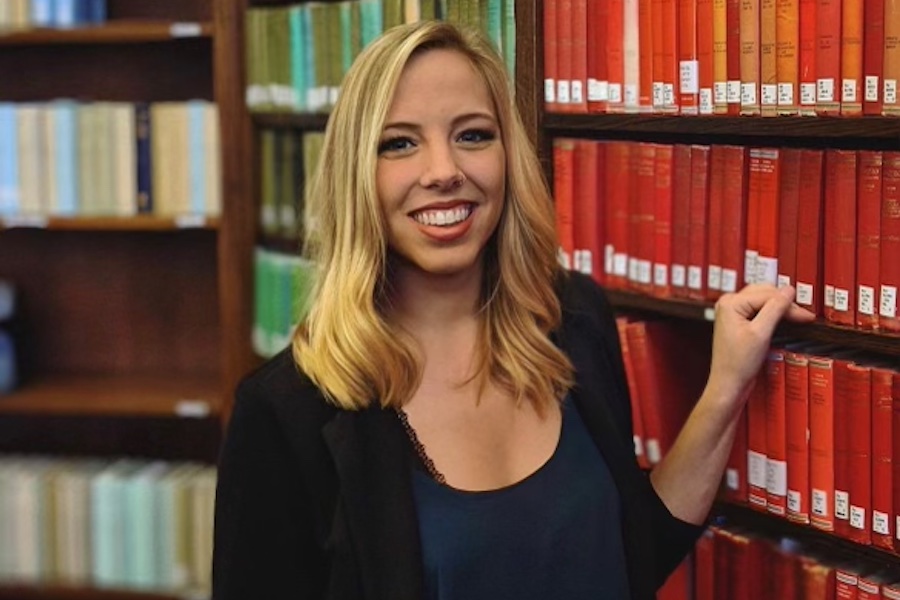Student Spotlight: Jessica Tilley

Jessica Tilley is a fifth year doctoral student studying classical archaeology in FSU’s Department of Classics, part of the College of Arts and Sciences. She plans to graduate next spring, and her current work focuses on death and cult behaviors during the Roman period in Greece. Tilley has worked on many archaeological projects allowing her to travel internationally, with her most recent excavations taking place in Greece and Italy.
Tell us a little about your background, where you’re from and what brought you to FSU.
Since I grew up in the Chicago area, I knew education was going to be the way out of poverty for me. As the first member of my family to go to college, I was determined to pursue higher education and work towards my dream of being an archaeologist. Getting my bachelor’s degree at DePauw University was the start of my commitment to higher education. When it was time to apply to graduate schools, my professor at DePauw suggested I consider FSU. The excellent faculty within the classics department at FSU alongside many international opportunities given to graduate students solidified my choice. Since being at FSU, I’m happy to say that it has lived up to its expectations.
What made you gravitate towards a degree in classical archaeology?
I’ve always been extremely captivated by stories of the past. From my perspective, archaeology tells the stories of people whose names didn’t make the history books. Classical archaeology grabbed my attention as I became fascinated by the history and art of ancient Greece and Rome. This sparked my interest in learning about how imperialism affected those who weren’t in powerful positions. Additionally, the large influence of Greek and Roman culture in American media, architecture, and law pushed me to critically engage with the strength of their impact.
Tell us about your recent international digs. Where did you go? What roles did you play?
This year, I worked as an archaeological supervisor at the site of ancient Corinth in Greece. Being a supervisor at Corinth was a really rewarding position as I got to work closely with the Greek archaeological technicians who have been excavating at the site for decades. No matter how much formal schooling I may acquire, I know I can always learn more from them. Another rewarding aspect of this dig was the ability to get hands-on experience identifying and dating the artifacts: pottery, coins and sculptures, then incorporating that data into the excavation report.
Excavating in Italy at Muro Leccese this year was different but equally rewarding. At Muro, it was fun to take a break from the position of supervisor and to get my hands dirty again — literally. The international nature of this project allowed me to meet so many scholars with similar passions yet very different backgrounds, including the same Italian team I worked with at Corinth months prior. This proves how important networking and collaboration is in classical archaeology.
What do you want the public to know about your research?
My research specifically focuses on Roman funeral practices in Greece. I would like the public to know that there is value in discussing these practices as they demonstrate ancient connectivity and globalism. My research also speaks to current discussions related to imperialism, changing identities, mobility, and more. My research considers a period of a region that has been largely dismissed by both scholars and the public, bringing important data to big conversations.
Tell us about receiving the Philip Lockhart Fellowship from the American School of Classical Studies at Athens.
I’m incredibly grateful I was awarded this fellowship from the American School of Classical Studies at Athens. This fellowship gave me the opportunity to take part in a year-long program at the research institution in Athens, involving intensive multi-week trips across Greece to many archaeological sites and museums. This fellowship also provided me with the opportunity to network with other scholars of antiquity from around the world, making lifelong connections.
What aspects of your recent archaeological projects do you find most rewarding?
The most rewarding aspect of my recent projects has been the opportunity to collaborate with scholars from around the world. On my most recent excavation, I was able to work with people from Italy, France, Germany, Spain, the United States and the Netherlands. Seeing people from a range of backgrounds come together, overcoming cultural and language barriers, was truly inspiring.
Tell us about earning the Betty Coate Award from the Association of Ancient Historians Subvention Committee. What does this award mean to you?
Earning the Betty Coate Award from the Association of Ancient Historians was a great reminder of the strengths in the classics community. Regardless that I’m an archaeologist and not strictly a historian, they saw value in my work and proved that my interdisciplinary collaborations were encouraged and supported.
What are some current goals you have? Are there any projects you are currently working on?
My current goal is to produce research for my dissertation, by analyzing the Roman grave data collected from the site of Corinth. Additionally, I’ll be preparing for my presentation on Roman funerary topography in Greece at the Archaeological Institute of America's annual conference this January.
What advice would you give your fellow students or upcoming graduate students?
My advice is to always be willing to learn from someone, regardless of who they are. Regardless of someone’s age, education, or language, they can always offer you something knowledgeable. Additionally, don’t be afraid to talk to your professors. The professors at FSU are amazing and brilliant, which can be intimidating, but they genuinely care about students succeeding and have a wealth of knowledge about available opportunities.
Even though leaving FSU may be bittersweet, what are you looking forward to once you graduate?
I’ve valued the teaching experiences I’ve had while at FSU, so I’m looking forward to passing on my passion for cultural heritage and classics to other students in the future.
